Teamwork & Communication: Building Effective Teams at UWTSD
VerifiedAdded on 2023/06/17
|10
|2751
|286
Report
AI Summary
This report examines effective team working and communication, focusing on how students at the University of Wales Trinity Saint David can develop effective teams. It discusses the impact of effective teamwork on team success, barriers to teamwork, and the various roles needed to create a cohesive and effective team, referencing Tuckman's theory of team development and Belbin's team roles. The report highlights the importance of clear goals, good communication, leadership skills, and trust in building strong team relationships and achieving organizational objectives. It also addresses potential conflicts, communication challenges, and management issues that can hinder teamwork, and emphasizes the need for discipline and punctuality in maintaining a positive work environment. Desklib provides this assignment solution along with other resources for students.
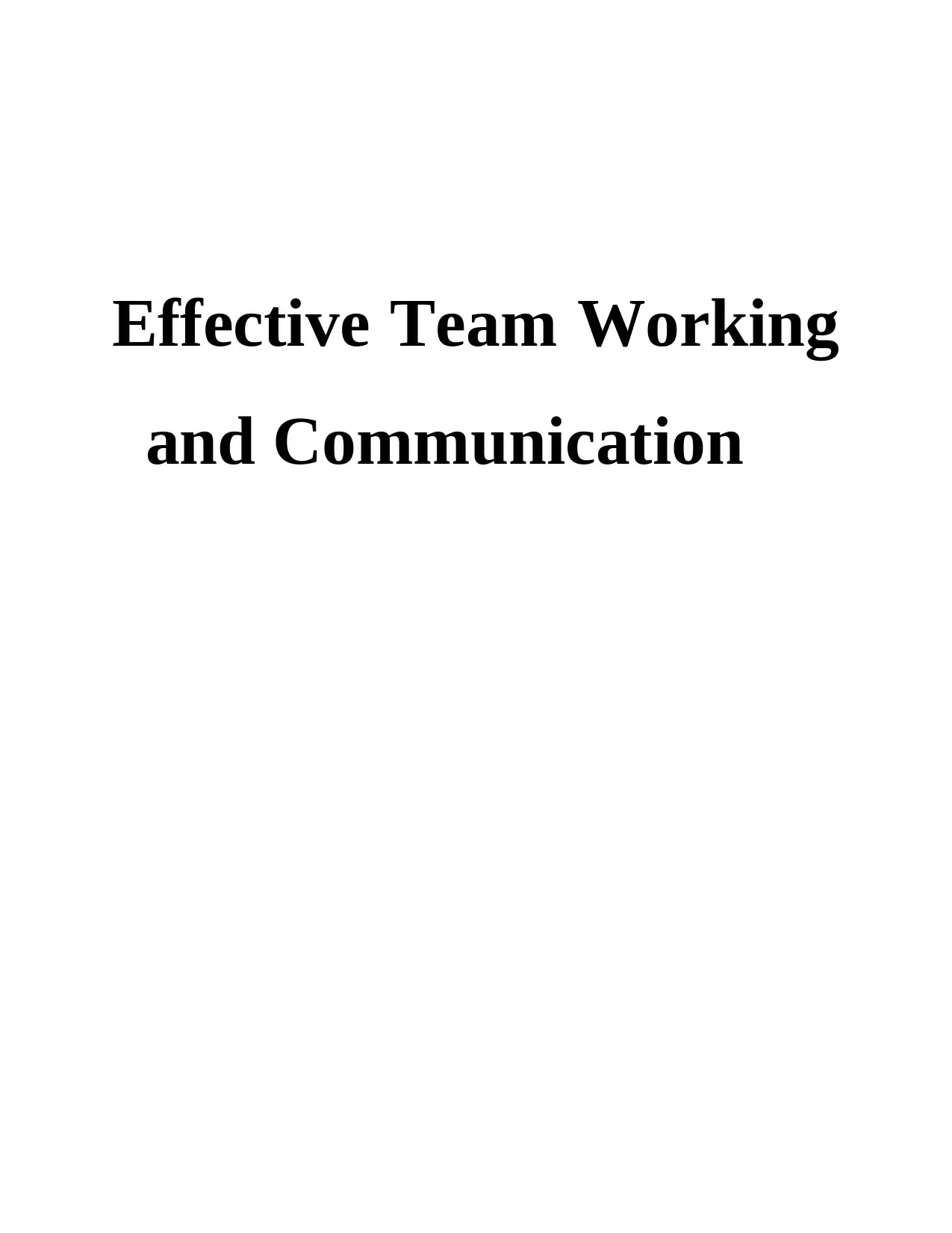
Effective Team Working
and Communication
and Communication
Secure Best Marks with AI Grader
Need help grading? Try our AI Grader for instant feedback on your assignments.
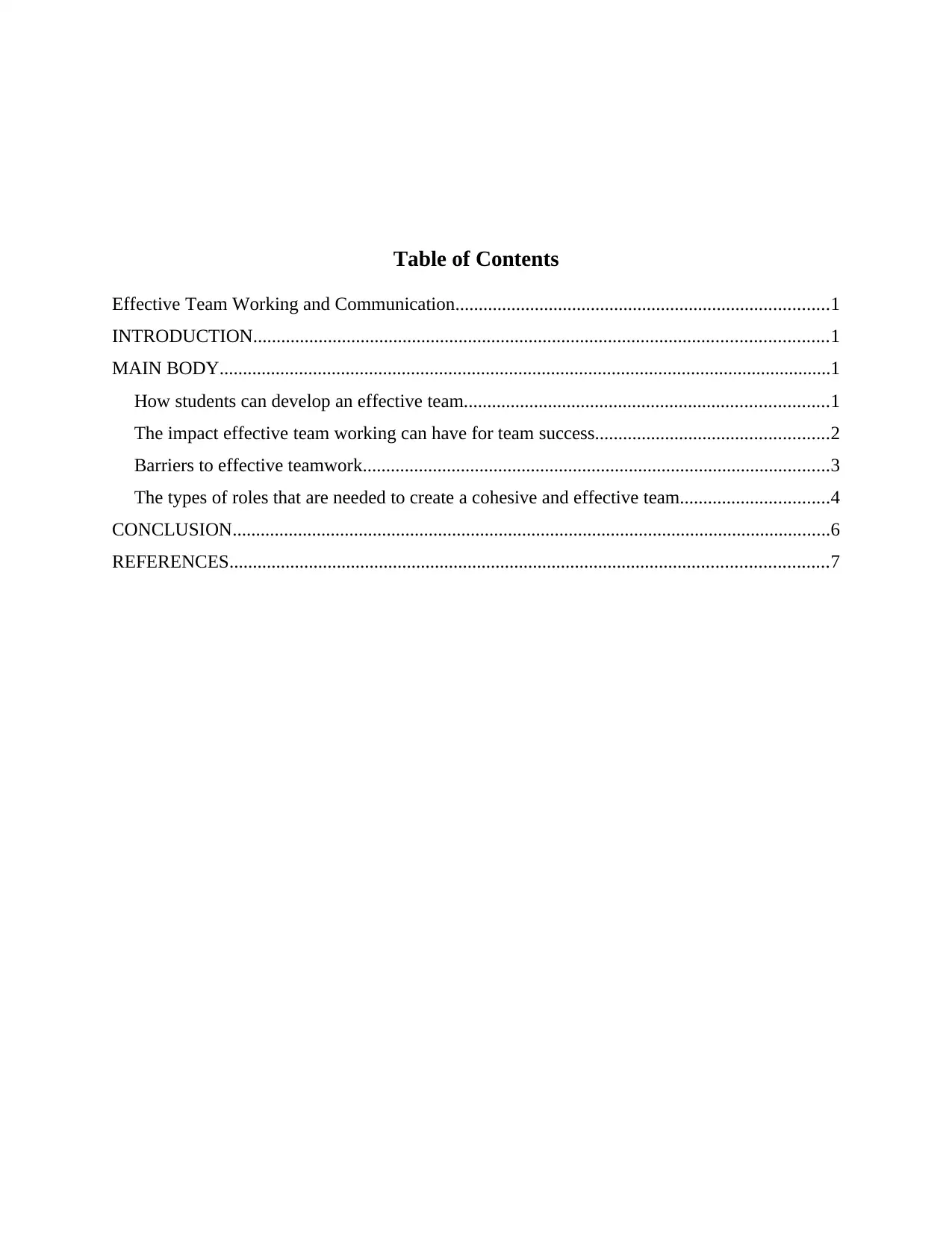
Table of Contents
Effective Team Working and Communication................................................................................1
INTRODUCTION...........................................................................................................................1
MAIN BODY...................................................................................................................................1
How students can develop an effective team..............................................................................1
The impact effective team working can have for team success..................................................2
Barriers to effective teamwork....................................................................................................3
The types of roles that are needed to create a cohesive and effective team................................4
CONCLUSION................................................................................................................................6
REFERENCES................................................................................................................................7
Effective Team Working and Communication................................................................................1
INTRODUCTION...........................................................................................................................1
MAIN BODY...................................................................................................................................1
How students can develop an effective team..............................................................................1
The impact effective team working can have for team success..................................................2
Barriers to effective teamwork....................................................................................................3
The types of roles that are needed to create a cohesive and effective team................................4
CONCLUSION................................................................................................................................6
REFERENCES................................................................................................................................7
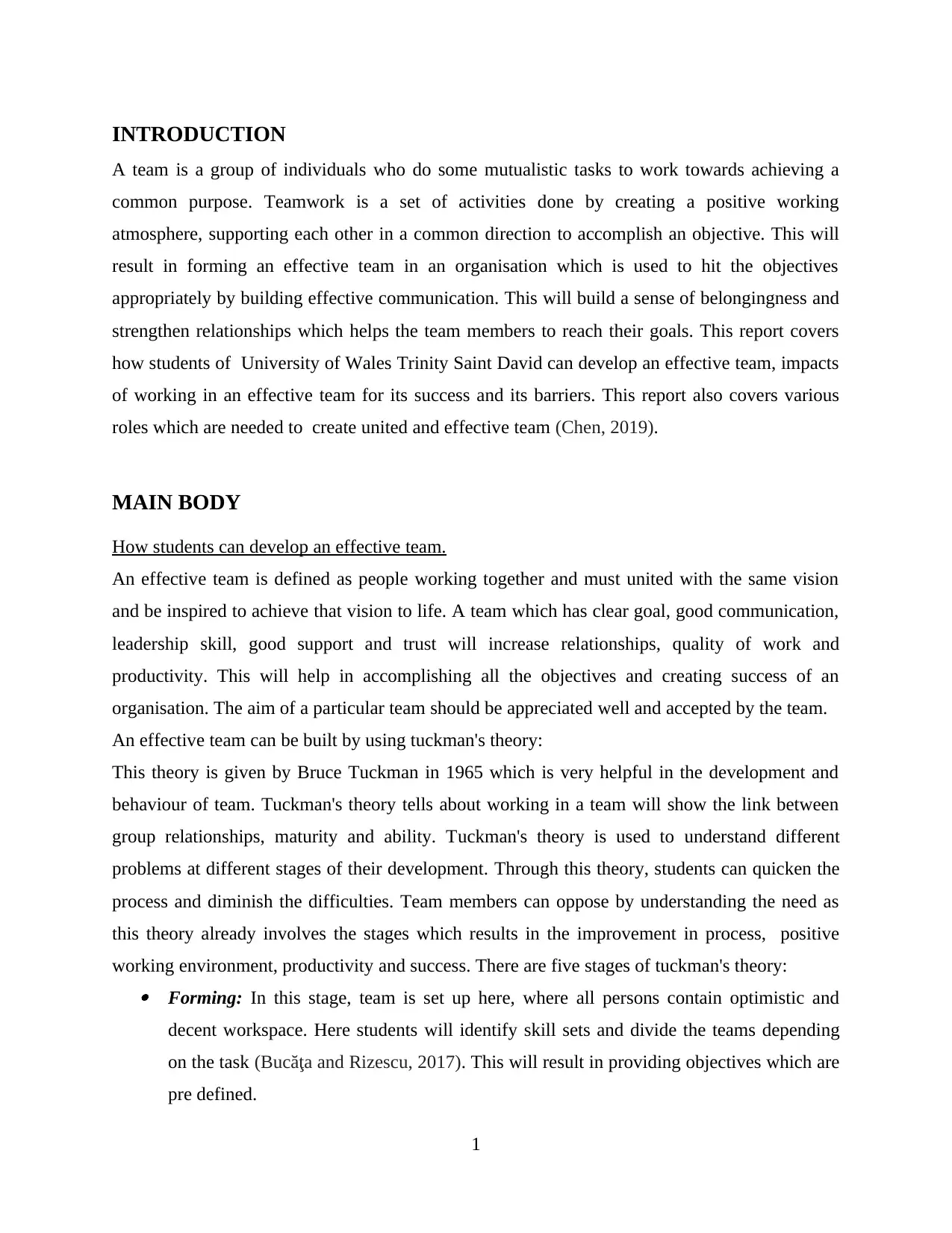
INTRODUCTION
A team is a group of individuals who do some mutualistic tasks to work towards achieving a
common purpose. Teamwork is a set of activities done by creating a positive working
atmosphere, supporting each other in a common direction to accomplish an objective. This will
result in forming an effective team in an organisation which is used to hit the objectives
appropriately by building effective communication. This will build a sense of belongingness and
strengthen relationships which helps the team members to reach their goals. This report covers
how students of University of Wales Trinity Saint David can develop an effective team, impacts
of working in an effective team for its success and its barriers. This report also covers various
roles which are needed to create united and effective team (Chen, 2019).
MAIN BODY
How students can develop an effective team.
An effective team is defined as people working together and must united with the same vision
and be inspired to achieve that vision to life. A team which has clear goal, good communication,
leadership skill, good support and trust will increase relationships, quality of work and
productivity. This will help in accomplishing all the objectives and creating success of an
organisation. The aim of a particular team should be appreciated well and accepted by the team.
An effective team can be built by using tuckman's theory:
This theory is given by Bruce Tuckman in 1965 which is very helpful in the development and
behaviour of team. Tuckman's theory tells about working in a team will show the link between
group relationships, maturity and ability. Tuckman's theory is used to understand different
problems at different stages of their development. Through this theory, students can quicken the
process and diminish the difficulties. Team members can oppose by understanding the need as
this theory already involves the stages which results in the improvement in process, positive
working environment, productivity and success. There are five stages of tuckman's theory: Forming: In this stage, team is set up here, where all persons contain optimistic and
decent workspace. Here students will identify skill sets and divide the teams depending
on the task (Bucăţa and Rizescu, 2017). This will result in providing objectives which are
pre defined.
1
A team is a group of individuals who do some mutualistic tasks to work towards achieving a
common purpose. Teamwork is a set of activities done by creating a positive working
atmosphere, supporting each other in a common direction to accomplish an objective. This will
result in forming an effective team in an organisation which is used to hit the objectives
appropriately by building effective communication. This will build a sense of belongingness and
strengthen relationships which helps the team members to reach their goals. This report covers
how students of University of Wales Trinity Saint David can develop an effective team, impacts
of working in an effective team for its success and its barriers. This report also covers various
roles which are needed to create united and effective team (Chen, 2019).
MAIN BODY
How students can develop an effective team.
An effective team is defined as people working together and must united with the same vision
and be inspired to achieve that vision to life. A team which has clear goal, good communication,
leadership skill, good support and trust will increase relationships, quality of work and
productivity. This will help in accomplishing all the objectives and creating success of an
organisation. The aim of a particular team should be appreciated well and accepted by the team.
An effective team can be built by using tuckman's theory:
This theory is given by Bruce Tuckman in 1965 which is very helpful in the development and
behaviour of team. Tuckman's theory tells about working in a team will show the link between
group relationships, maturity and ability. Tuckman's theory is used to understand different
problems at different stages of their development. Through this theory, students can quicken the
process and diminish the difficulties. Team members can oppose by understanding the need as
this theory already involves the stages which results in the improvement in process, positive
working environment, productivity and success. There are five stages of tuckman's theory: Forming: In this stage, team is set up here, where all persons contain optimistic and
decent workspace. Here students will identify skill sets and divide the teams depending
on the task (Bucăţa and Rizescu, 2017). This will result in providing objectives which are
pre defined.
1
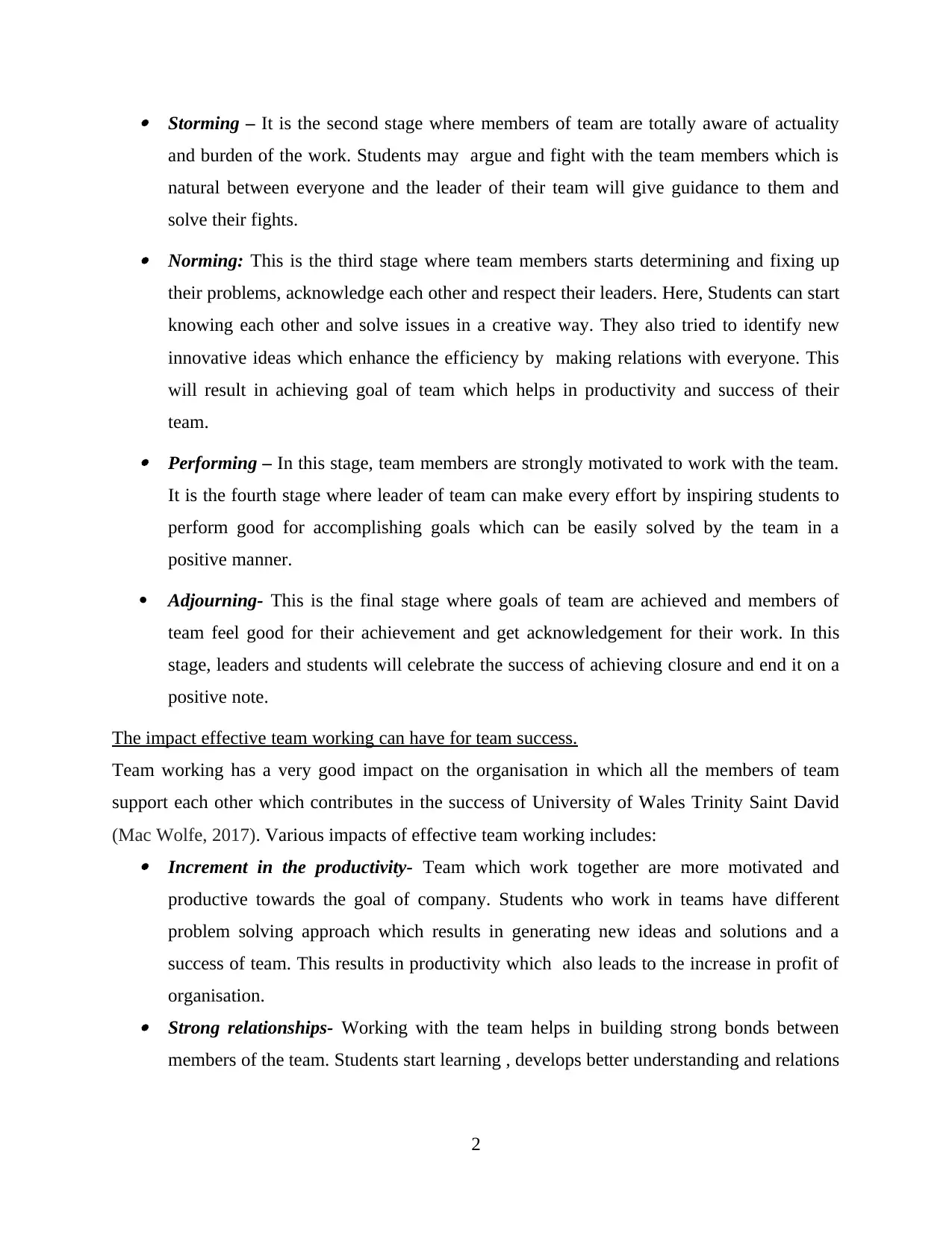
Storming – It is the second stage where members of team are totally aware of actuality
and burden of the work. Students may argue and fight with the team members which is
natural between everyone and the leader of their team will give guidance to them and
solve their fights. Norming: This is the third stage where team members starts determining and fixing up
their problems, acknowledge each other and respect their leaders. Here, Students can start
knowing each other and solve issues in a creative way. They also tried to identify new
innovative ideas which enhance the efficiency by making relations with everyone. This
will result in achieving goal of team which helps in productivity and success of their
team. Performing – In this stage, team members are strongly motivated to work with the team.
It is the fourth stage where leader of team can make every effort by inspiring students to
perform good for accomplishing goals which can be easily solved by the team in a
positive manner.
Adjourning- This is the final stage where goals of team are achieved and members of
team feel good for their achievement and get acknowledgement for their work. In this
stage, leaders and students will celebrate the success of achieving closure and end it on a
positive note.
The impact effective team working can have for team success.
Team working has a very good impact on the organisation in which all the members of team
support each other which contributes in the success of University of Wales Trinity Saint David
(Mac Wolfe, 2017). Various impacts of effective team working includes: Increment in the productivity- Team which work together are more motivated and
productive towards the goal of company. Students who work in teams have different
problem solving approach which results in generating new ideas and solutions and a
success of team. This results in productivity which also leads to the increase in profit of
organisation. Strong relationships- Working with the team helps in building strong bonds between
members of the team. Students start learning , develops better understanding and relations
2
and burden of the work. Students may argue and fight with the team members which is
natural between everyone and the leader of their team will give guidance to them and
solve their fights. Norming: This is the third stage where team members starts determining and fixing up
their problems, acknowledge each other and respect their leaders. Here, Students can start
knowing each other and solve issues in a creative way. They also tried to identify new
innovative ideas which enhance the efficiency by making relations with everyone. This
will result in achieving goal of team which helps in productivity and success of their
team. Performing – In this stage, team members are strongly motivated to work with the team.
It is the fourth stage where leader of team can make every effort by inspiring students to
perform good for accomplishing goals which can be easily solved by the team in a
positive manner.
Adjourning- This is the final stage where goals of team are achieved and members of
team feel good for their achievement and get acknowledgement for their work. In this
stage, leaders and students will celebrate the success of achieving closure and end it on a
positive note.
The impact effective team working can have for team success.
Team working has a very good impact on the organisation in which all the members of team
support each other which contributes in the success of University of Wales Trinity Saint David
(Mac Wolfe, 2017). Various impacts of effective team working includes: Increment in the productivity- Team which work together are more motivated and
productive towards the goal of company. Students who work in teams have different
problem solving approach which results in generating new ideas and solutions and a
success of team. This results in productivity which also leads to the increase in profit of
organisation. Strong relationships- Working with the team helps in building strong bonds between
members of the team. Students start learning , develops better understanding and relations
2
Secure Best Marks with AI Grader
Need help grading? Try our AI Grader for instant feedback on your assignments.
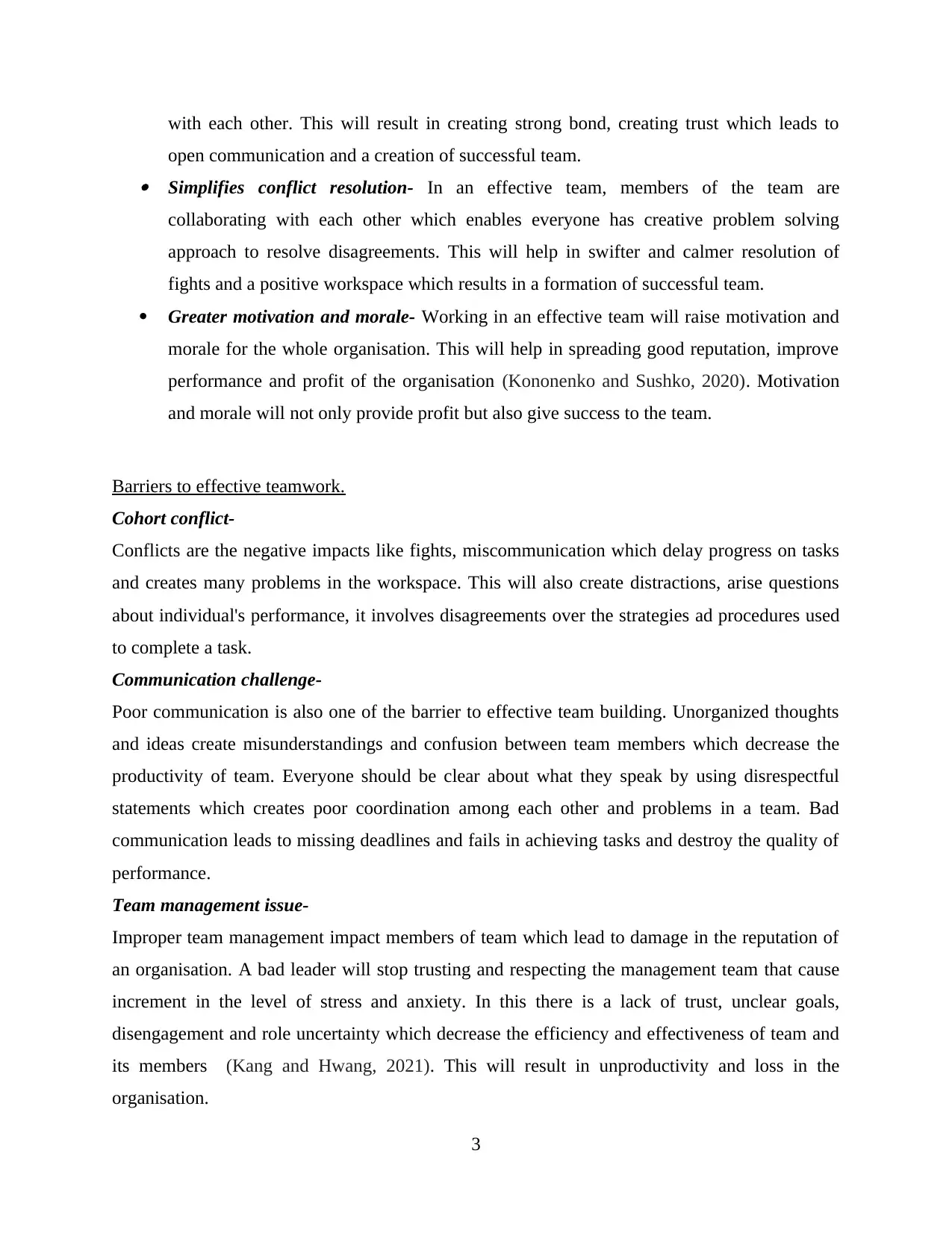
with each other. This will result in creating strong bond, creating trust which leads to
open communication and a creation of successful team. Simplifies conflict resolution- In an effective team, members of the team are
collaborating with each other which enables everyone has creative problem solving
approach to resolve disagreements. This will help in swifter and calmer resolution of
fights and a positive workspace which results in a formation of successful team.
Greater motivation and morale- Working in an effective team will raise motivation and
morale for the whole organisation. This will help in spreading good reputation, improve
performance and profit of the organisation (Kononenko and Sushko, 2020). Motivation
and morale will not only provide profit but also give success to the team.
Barriers to effective teamwork.
Cohort conflict-
Conflicts are the negative impacts like fights, miscommunication which delay progress on tasks
and creates many problems in the workspace. This will also create distractions, arise questions
about individual's performance, it involves disagreements over the strategies ad procedures used
to complete a task.
Communication challenge-
Poor communication is also one of the barrier to effective team building. Unorganized thoughts
and ideas create misunderstandings and confusion between team members which decrease the
productivity of team. Everyone should be clear about what they speak by using disrespectful
statements which creates poor coordination among each other and problems in a team. Bad
communication leads to missing deadlines and fails in achieving tasks and destroy the quality of
performance.
Team management issue-
Improper team management impact members of team which lead to damage in the reputation of
an organisation. A bad leader will stop trusting and respecting the management team that cause
increment in the level of stress and anxiety. In this there is a lack of trust, unclear goals,
disengagement and role uncertainty which decrease the efficiency and effectiveness of team and
its members (Kang and Hwang, 2021). This will result in unproductivity and loss in the
organisation.
3
open communication and a creation of successful team. Simplifies conflict resolution- In an effective team, members of the team are
collaborating with each other which enables everyone has creative problem solving
approach to resolve disagreements. This will help in swifter and calmer resolution of
fights and a positive workspace which results in a formation of successful team.
Greater motivation and morale- Working in an effective team will raise motivation and
morale for the whole organisation. This will help in spreading good reputation, improve
performance and profit of the organisation (Kononenko and Sushko, 2020). Motivation
and morale will not only provide profit but also give success to the team.
Barriers to effective teamwork.
Cohort conflict-
Conflicts are the negative impacts like fights, miscommunication which delay progress on tasks
and creates many problems in the workspace. This will also create distractions, arise questions
about individual's performance, it involves disagreements over the strategies ad procedures used
to complete a task.
Communication challenge-
Poor communication is also one of the barrier to effective team building. Unorganized thoughts
and ideas create misunderstandings and confusion between team members which decrease the
productivity of team. Everyone should be clear about what they speak by using disrespectful
statements which creates poor coordination among each other and problems in a team. Bad
communication leads to missing deadlines and fails in achieving tasks and destroy the quality of
performance.
Team management issue-
Improper team management impact members of team which lead to damage in the reputation of
an organisation. A bad leader will stop trusting and respecting the management team that cause
increment in the level of stress and anxiety. In this there is a lack of trust, unclear goals,
disengagement and role uncertainty which decrease the efficiency and effectiveness of team and
its members (Kang and Hwang, 2021). This will result in unproductivity and loss in the
organisation.
3
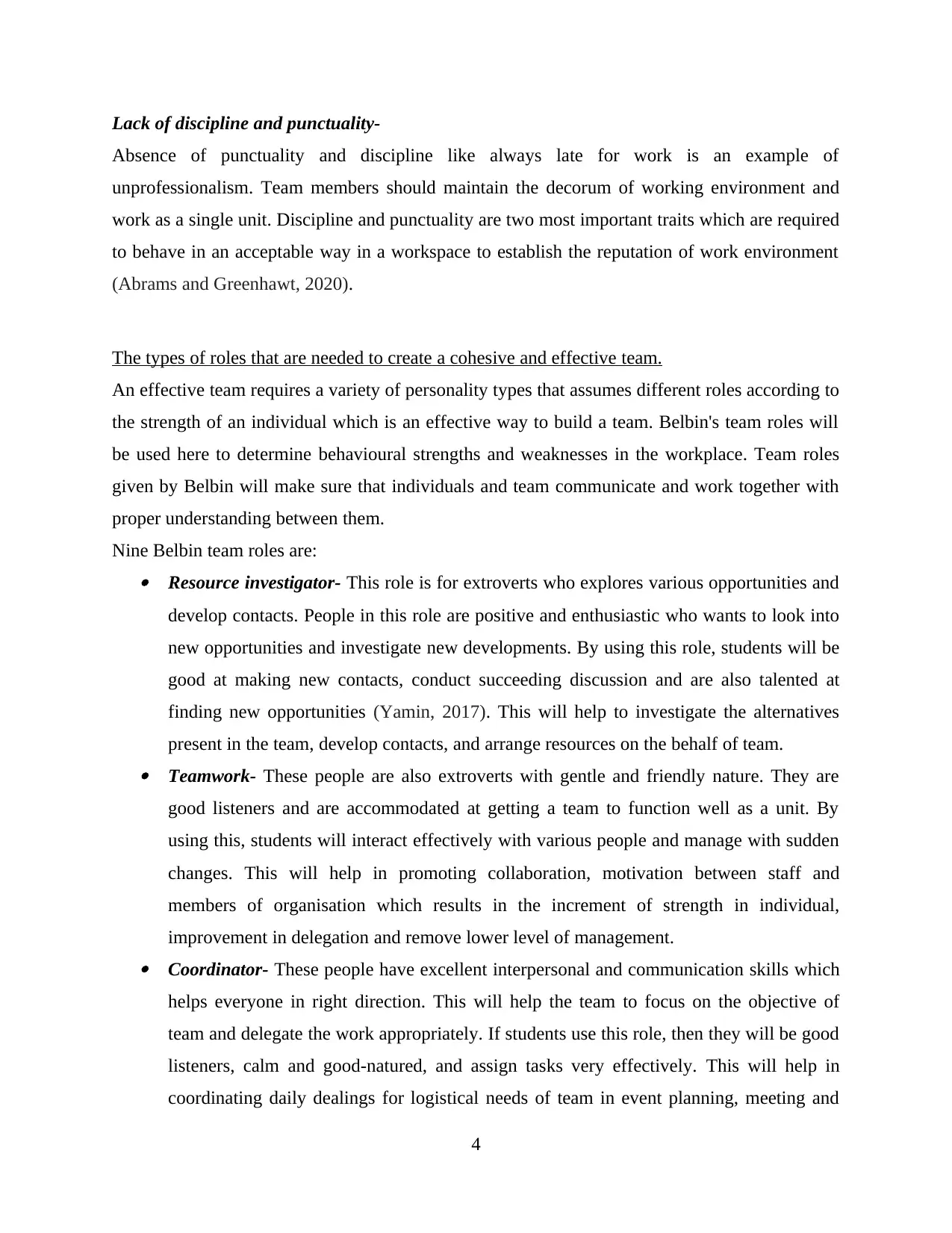
Lack of discipline and punctuality-
Absence of punctuality and discipline like always late for work is an example of
unprofessionalism. Team members should maintain the decorum of working environment and
work as a single unit. Discipline and punctuality are two most important traits which are required
to behave in an acceptable way in a workspace to establish the reputation of work environment
(Abrams and Greenhawt, 2020).
The types of roles that are needed to create a cohesive and effective team.
An effective team requires a variety of personality types that assumes different roles according to
the strength of an individual which is an effective way to build a team. Belbin's team roles will
be used here to determine behavioural strengths and weaknesses in the workplace. Team roles
given by Belbin will make sure that individuals and team communicate and work together with
proper understanding between them.
Nine Belbin team roles are: Resource investigator- This role is for extroverts who explores various opportunities and
develop contacts. People in this role are positive and enthusiastic who wants to look into
new opportunities and investigate new developments. By using this role, students will be
good at making new contacts, conduct succeeding discussion and are also talented at
finding new opportunities (Yamin, 2017). This will help to investigate the alternatives
present in the team, develop contacts, and arrange resources on the behalf of team. Teamwork- These people are also extroverts with gentle and friendly nature. They are
good listeners and are accommodated at getting a team to function well as a unit. By
using this, students will interact effectively with various people and manage with sudden
changes. This will help in promoting collaboration, motivation between staff and
members of organisation which results in the increment of strength in individual,
improvement in delegation and remove lower level of management. Coordinator- These people have excellent interpersonal and communication skills which
helps everyone in right direction. This will help the team to focus on the objective of
team and delegate the work appropriately. If students use this role, then they will be good
listeners, calm and good-natured, and assign tasks very effectively. This will help in
coordinating daily dealings for logistical needs of team in event planning, meeting and
4
Absence of punctuality and discipline like always late for work is an example of
unprofessionalism. Team members should maintain the decorum of working environment and
work as a single unit. Discipline and punctuality are two most important traits which are required
to behave in an acceptable way in a workspace to establish the reputation of work environment
(Abrams and Greenhawt, 2020).
The types of roles that are needed to create a cohesive and effective team.
An effective team requires a variety of personality types that assumes different roles according to
the strength of an individual which is an effective way to build a team. Belbin's team roles will
be used here to determine behavioural strengths and weaknesses in the workplace. Team roles
given by Belbin will make sure that individuals and team communicate and work together with
proper understanding between them.
Nine Belbin team roles are: Resource investigator- This role is for extroverts who explores various opportunities and
develop contacts. People in this role are positive and enthusiastic who wants to look into
new opportunities and investigate new developments. By using this role, students will be
good at making new contacts, conduct succeeding discussion and are also talented at
finding new opportunities (Yamin, 2017). This will help to investigate the alternatives
present in the team, develop contacts, and arrange resources on the behalf of team. Teamwork- These people are also extroverts with gentle and friendly nature. They are
good listeners and are accommodated at getting a team to function well as a unit. By
using this, students will interact effectively with various people and manage with sudden
changes. This will help in promoting collaboration, motivation between staff and
members of organisation which results in the increment of strength in individual,
improvement in delegation and remove lower level of management. Coordinator- These people have excellent interpersonal and communication skills which
helps everyone in right direction. This will help the team to focus on the objective of
team and delegate the work appropriately. If students use this role, then they will be good
listeners, calm and good-natured, and assign tasks very effectively. This will help in
coordinating daily dealings for logistical needs of team in event planning, meeting and
4
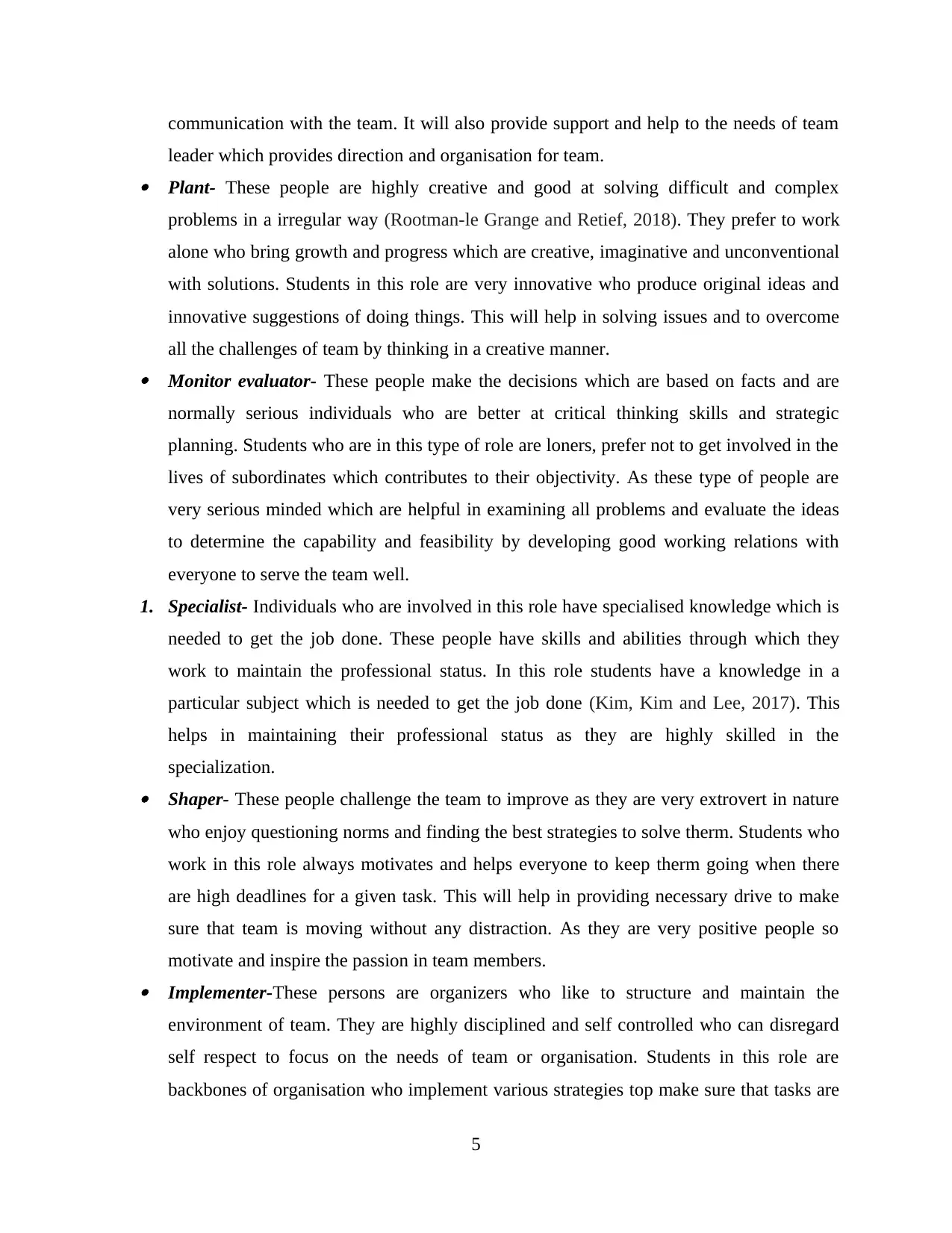
communication with the team. It will also provide support and help to the needs of team
leader which provides direction and organisation for team. Plant- These people are highly creative and good at solving difficult and complex
problems in a irregular way (Rootman-le Grange and Retief, 2018). They prefer to work
alone who bring growth and progress which are creative, imaginative and unconventional
with solutions. Students in this role are very innovative who produce original ideas and
innovative suggestions of doing things. This will help in solving issues and to overcome
all the challenges of team by thinking in a creative manner. Monitor evaluator- These people make the decisions which are based on facts and are
normally serious individuals who are better at critical thinking skills and strategic
planning. Students who are in this type of role are loners, prefer not to get involved in the
lives of subordinates which contributes to their objectivity. As these type of people are
very serious minded which are helpful in examining all problems and evaluate the ideas
to determine the capability and feasibility by developing good working relations with
everyone to serve the team well.
1. Specialist- Individuals who are involved in this role have specialised knowledge which is
needed to get the job done. These people have skills and abilities through which they
work to maintain the professional status. In this role students have a knowledge in a
particular subject which is needed to get the job done (Kim, Kim and Lee, 2017). This
helps in maintaining their professional status as they are highly skilled in the
specialization. Shaper- These people challenge the team to improve as they are very extrovert in nature
who enjoy questioning norms and finding the best strategies to solve therm. Students who
work in this role always motivates and helps everyone to keep therm going when there
are high deadlines for a given task. This will help in providing necessary drive to make
sure that team is moving without any distraction. As they are very positive people so
motivate and inspire the passion in team members. Implementer-These persons are organizers who like to structure and maintain the
environment of team. They are highly disciplined and self controlled who can disregard
self respect to focus on the needs of team or organisation. Students in this role are
backbones of organisation who implement various strategies top make sure that tasks are
5
leader which provides direction and organisation for team. Plant- These people are highly creative and good at solving difficult and complex
problems in a irregular way (Rootman-le Grange and Retief, 2018). They prefer to work
alone who bring growth and progress which are creative, imaginative and unconventional
with solutions. Students in this role are very innovative who produce original ideas and
innovative suggestions of doing things. This will help in solving issues and to overcome
all the challenges of team by thinking in a creative manner. Monitor evaluator- These people make the decisions which are based on facts and are
normally serious individuals who are better at critical thinking skills and strategic
planning. Students who are in this type of role are loners, prefer not to get involved in the
lives of subordinates which contributes to their objectivity. As these type of people are
very serious minded which are helpful in examining all problems and evaluate the ideas
to determine the capability and feasibility by developing good working relations with
everyone to serve the team well.
1. Specialist- Individuals who are involved in this role have specialised knowledge which is
needed to get the job done. These people have skills and abilities through which they
work to maintain the professional status. In this role students have a knowledge in a
particular subject which is needed to get the job done (Kim, Kim and Lee, 2017). This
helps in maintaining their professional status as they are highly skilled in the
specialization. Shaper- These people challenge the team to improve as they are very extrovert in nature
who enjoy questioning norms and finding the best strategies to solve therm. Students who
work in this role always motivates and helps everyone to keep therm going when there
are high deadlines for a given task. This will help in providing necessary drive to make
sure that team is moving without any distraction. As they are very positive people so
motivate and inspire the passion in team members. Implementer-These persons are organizers who like to structure and maintain the
environment of team. They are highly disciplined and self controlled who can disregard
self respect to focus on the needs of team or organisation. Students in this role are
backbones of organisation who implement various strategies top make sure that tasks are
5
Paraphrase This Document
Need a fresh take? Get an instant paraphrase of this document with our AI Paraphraser
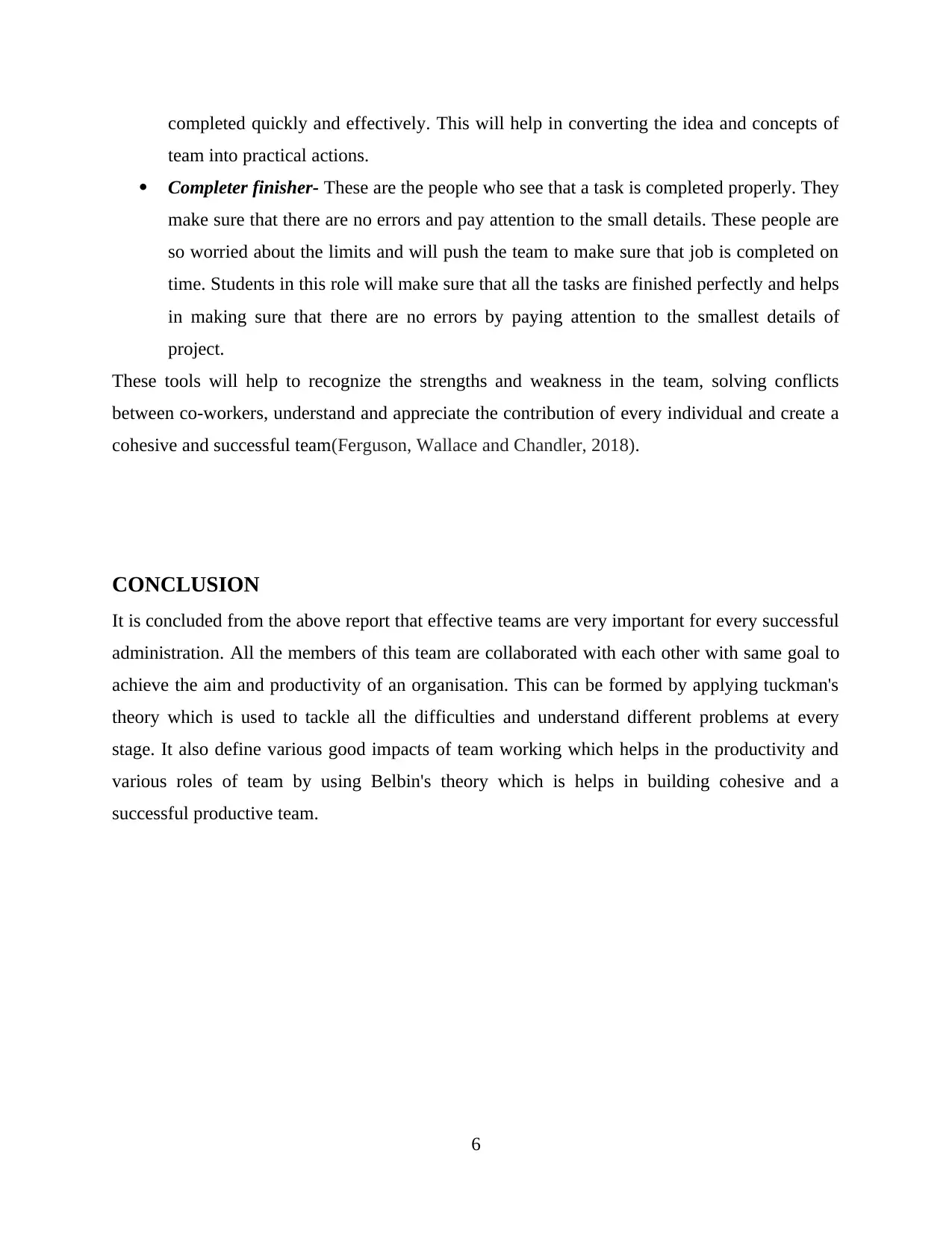
completed quickly and effectively. This will help in converting the idea and concepts of
team into practical actions.
Completer finisher- These are the people who see that a task is completed properly. They
make sure that there are no errors and pay attention to the small details. These people are
so worried about the limits and will push the team to make sure that job is completed on
time. Students in this role will make sure that all the tasks are finished perfectly and helps
in making sure that there are no errors by paying attention to the smallest details of
project.
These tools will help to recognize the strengths and weakness in the team, solving conflicts
between co-workers, understand and appreciate the contribution of every individual and create a
cohesive and successful team(Ferguson, Wallace and Chandler, 2018).
CONCLUSION
It is concluded from the above report that effective teams are very important for every successful
administration. All the members of this team are collaborated with each other with same goal to
achieve the aim and productivity of an organisation. This can be formed by applying tuckman's
theory which is used to tackle all the difficulties and understand different problems at every
stage. It also define various good impacts of team working which helps in the productivity and
various roles of team by using Belbin's theory which is helps in building cohesive and a
successful productive team.
6
team into practical actions.
Completer finisher- These are the people who see that a task is completed properly. They
make sure that there are no errors and pay attention to the small details. These people are
so worried about the limits and will push the team to make sure that job is completed on
time. Students in this role will make sure that all the tasks are finished perfectly and helps
in making sure that there are no errors by paying attention to the smallest details of
project.
These tools will help to recognize the strengths and weakness in the team, solving conflicts
between co-workers, understand and appreciate the contribution of every individual and create a
cohesive and successful team(Ferguson, Wallace and Chandler, 2018).
CONCLUSION
It is concluded from the above report that effective teams are very important for every successful
administration. All the members of this team are collaborated with each other with same goal to
achieve the aim and productivity of an organisation. This can be formed by applying tuckman's
theory which is used to tackle all the difficulties and understand different problems at every
stage. It also define various good impacts of team working which helps in the productivity and
various roles of team by using Belbin's theory which is helps in building cohesive and a
successful productive team.
6
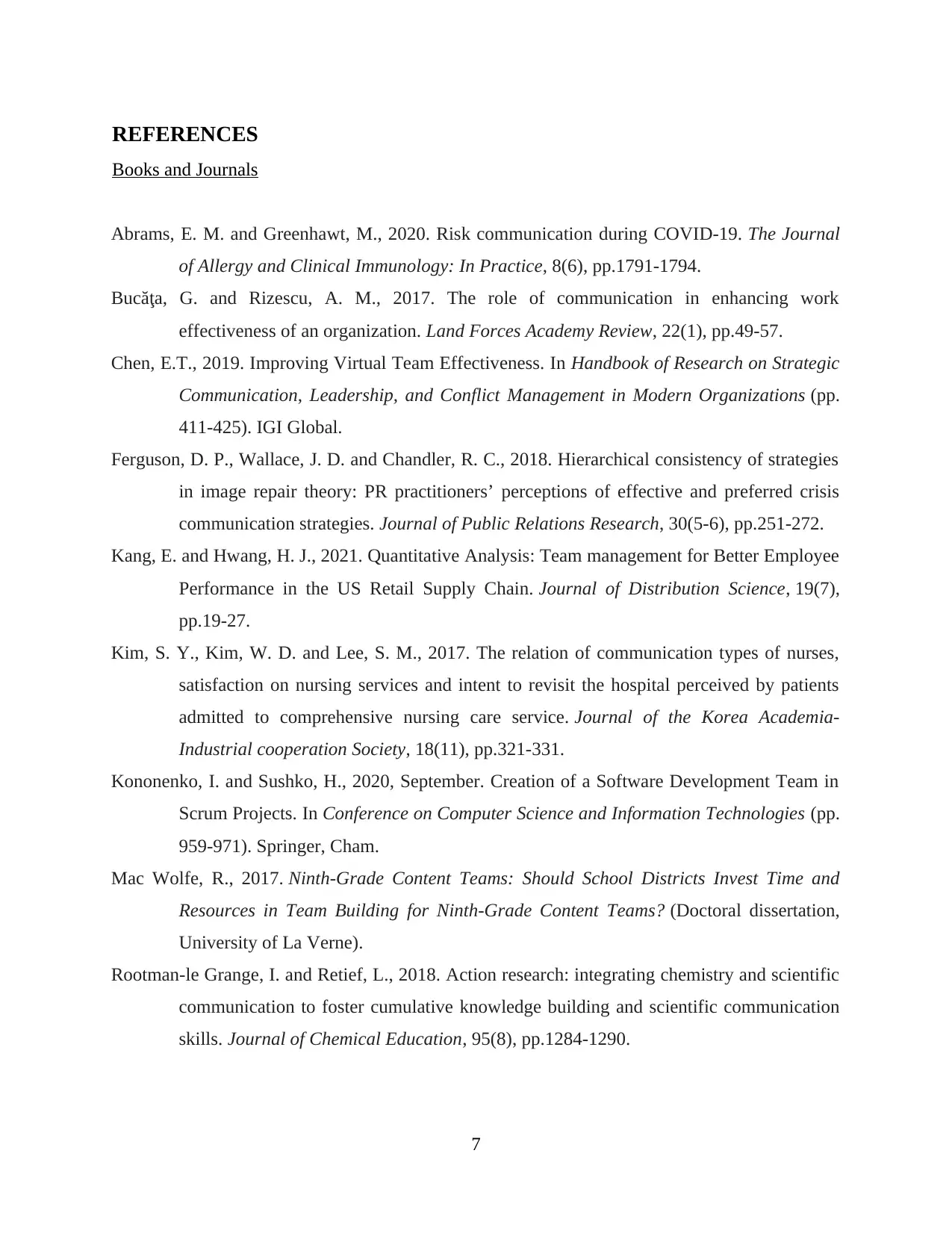
REFERENCES
Books and Journals
Abrams, E. M. and Greenhawt, M., 2020. Risk communication during COVID-19. The Journal
of Allergy and Clinical Immunology: In Practice, 8(6), pp.1791-1794.
Bucăţa, G. and Rizescu, A. M., 2017. The role of communication in enhancing work
effectiveness of an organization. Land Forces Academy Review, 22(1), pp.49-57.
Chen, E.T., 2019. Improving Virtual Team Effectiveness. In Handbook of Research on Strategic
Communication, Leadership, and Conflict Management in Modern Organizations (pp.
411-425). IGI Global.
Ferguson, D. P., Wallace, J. D. and Chandler, R. C., 2018. Hierarchical consistency of strategies
in image repair theory: PR practitioners’ perceptions of effective and preferred crisis
communication strategies. Journal of Public Relations Research, 30(5-6), pp.251-272.
Kang, E. and Hwang, H. J., 2021. Quantitative Analysis: Team management for Better Employee
Performance in the US Retail Supply Chain. Journal of Distribution Science, 19(7),
pp.19-27.
Kim, S. Y., Kim, W. D. and Lee, S. M., 2017. The relation of communication types of nurses,
satisfaction on nursing services and intent to revisit the hospital perceived by patients
admitted to comprehensive nursing care service. Journal of the Korea Academia-
Industrial cooperation Society, 18(11), pp.321-331.
Kononenko, I. and Sushko, H., 2020, September. Creation of a Software Development Team in
Scrum Projects. In Conference on Computer Science and Information Technologies (pp.
959-971). Springer, Cham.
Mac Wolfe, R., 2017. Ninth-Grade Content Teams: Should School Districts Invest Time and
Resources in Team Building for Ninth-Grade Content Teams? (Doctoral dissertation,
University of La Verne).
Rootman-le Grange, I. and Retief, L., 2018. Action research: integrating chemistry and scientific
communication to foster cumulative knowledge building and scientific communication
skills. Journal of Chemical Education, 95(8), pp.1284-1290.
7
Books and Journals
Abrams, E. M. and Greenhawt, M., 2020. Risk communication during COVID-19. The Journal
of Allergy and Clinical Immunology: In Practice, 8(6), pp.1791-1794.
Bucăţa, G. and Rizescu, A. M., 2017. The role of communication in enhancing work
effectiveness of an organization. Land Forces Academy Review, 22(1), pp.49-57.
Chen, E.T., 2019. Improving Virtual Team Effectiveness. In Handbook of Research on Strategic
Communication, Leadership, and Conflict Management in Modern Organizations (pp.
411-425). IGI Global.
Ferguson, D. P., Wallace, J. D. and Chandler, R. C., 2018. Hierarchical consistency of strategies
in image repair theory: PR practitioners’ perceptions of effective and preferred crisis
communication strategies. Journal of Public Relations Research, 30(5-6), pp.251-272.
Kang, E. and Hwang, H. J., 2021. Quantitative Analysis: Team management for Better Employee
Performance in the US Retail Supply Chain. Journal of Distribution Science, 19(7),
pp.19-27.
Kim, S. Y., Kim, W. D. and Lee, S. M., 2017. The relation of communication types of nurses,
satisfaction on nursing services and intent to revisit the hospital perceived by patients
admitted to comprehensive nursing care service. Journal of the Korea Academia-
Industrial cooperation Society, 18(11), pp.321-331.
Kononenko, I. and Sushko, H., 2020, September. Creation of a Software Development Team in
Scrum Projects. In Conference on Computer Science and Information Technologies (pp.
959-971). Springer, Cham.
Mac Wolfe, R., 2017. Ninth-Grade Content Teams: Should School Districts Invest Time and
Resources in Team Building for Ninth-Grade Content Teams? (Doctoral dissertation,
University of La Verne).
Rootman-le Grange, I. and Retief, L., 2018. Action research: integrating chemistry and scientific
communication to foster cumulative knowledge building and scientific communication
skills. Journal of Chemical Education, 95(8), pp.1284-1290.
7
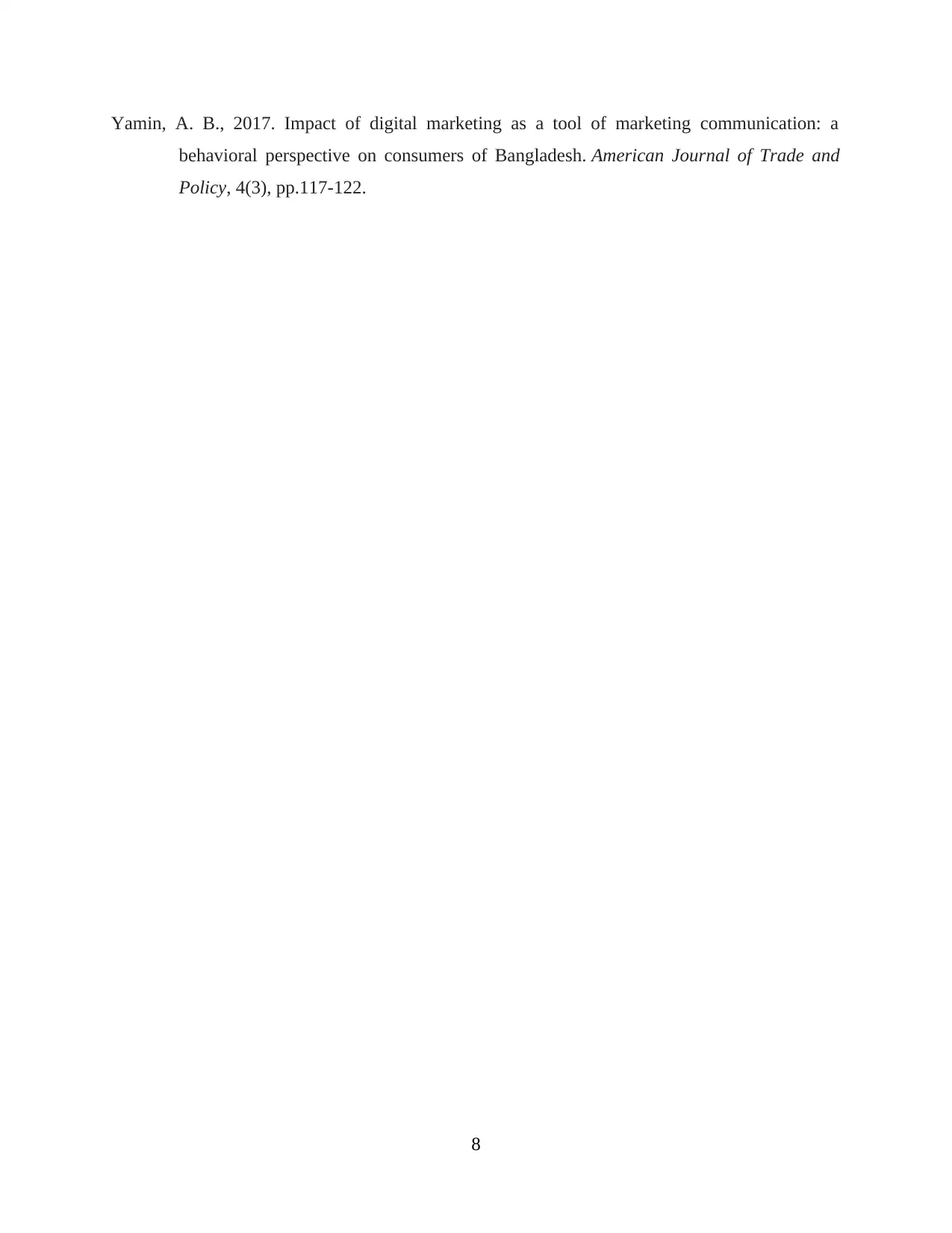
Yamin, A. B., 2017. Impact of digital marketing as a tool of marketing communication: a
behavioral perspective on consumers of Bangladesh. American Journal of Trade and
Policy, 4(3), pp.117-122.
8
behavioral perspective on consumers of Bangladesh. American Journal of Trade and
Policy, 4(3), pp.117-122.
8
1 out of 10
Related Documents
Your All-in-One AI-Powered Toolkit for Academic Success.
+13062052269
info@desklib.com
Available 24*7 on WhatsApp / Email
![[object Object]](/_next/static/media/star-bottom.7253800d.svg)
Unlock your academic potential
© 2024 | Zucol Services PVT LTD | All rights reserved.




